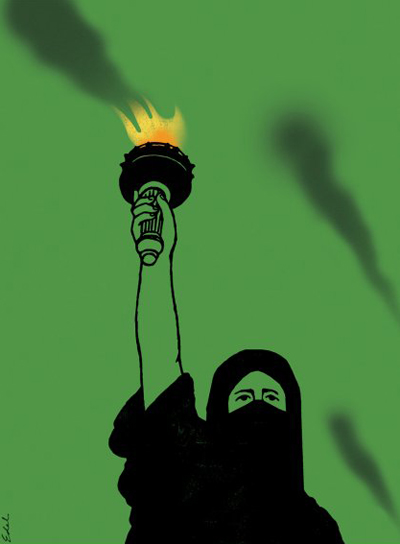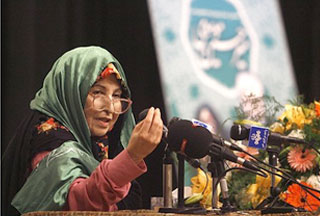Iran's Proposed Three Female Ministers Under Attack From All Sides
/The title of Huff Po’s article on new developments in Iran will concern and infuriate Muslim women, depending on their point of view.: Male Clerics Call for Justice While Female Parliamentarians Advocate for Discriminatory Laws Against Women.
If you’re a Muslim woman who supports Iran’s President Ahmadinejad’s presidency and government, you probably will embrace his apointments of Fatemeh Ajorlou for the Welfare and Social Justice Ministry, Marzieh Vahid Dastjerdi for the Health Ministry, and Susan Keshavarz for the Ministry of Education.
Writer Sara Dehghan assesses the women’s voting rocords in Parliament, making her case why the three women are generally opposed to rights for Iranian women. Fatemeh Ajorlou is fully devoted to Islamic laws including severe penalties including stoning and execution for prostitution and adultery yet believing in temporary marriage to prevent what they consider “social corruption”, according to Dehghan.
 Also focusing on Fatemeh Ajoriou, Kimia Sanati, writing for Iranquest, quoted Ajorlou’s opposiiion to temporary marriages: “Unmarried people are not interested in temporary marriages at all and it is mostly married men who take temporary wives,” Fatemeh Ajorlou, a conservative female member of parliament, told the Iranian Students News Agency. “Many women are hurt seriously by entering temporary marriages and the harm affects not only the women themselves but also their families,” she said.
Also focusing on Fatemeh Ajoriou, Kimia Sanati, writing for Iranquest, quoted Ajorlou’s opposiiion to temporary marriages: “Unmarried people are not interested in temporary marriages at all and it is mostly married men who take temporary wives,” Fatemeh Ajorlou, a conservative female member of parliament, told the Iranian Students News Agency. “Many women are hurt seriously by entering temporary marriages and the harm affects not only the women themselves but also their families,” she said.
The conservatives in Iran aren’t any happier about the proposed women ministers. The Iranian-born journalist Amir Taheri recalls that one of Ayatollah Ruhollah Khomeini’s last sermons emphasized the “three threats’’ confronting Islam: America, Jews, and women. Women organized the first mass demonstration against the new Khomeini regime in 1979, Taheri writes. In the years that followed, “the authorities imprisoned hundreds of thousands of women … and executed thousands.’’ via Iranquest.
Today, IPS News is reporting that clerics are opposed to even the most conservative women serving in the Iranian government. One of the strongest denunciations came from Fatemeh Rajabi, a staunch supporter of Ahmadinejad. Rajabi viewed the nominations as a step toward pushing “the harmful goals of feminists and secularists”.
The Friday Prayer leader of Mashad, Ayatollah Alam Alhadi, has said that the “nominations only please immoral feminists”.
Ayatollah Yousef Tabatabai-Nejad, the Friday Prayer Leader of Isfahan, has argued against the nominations on religious grounds, saying that “women who are ministers will have to be in regular contact with men and their male deputies, and will not be able to adhere fully to their religious obligations.” via IPS News
Reading on from IPS News, their assessment of the women’s rights records of the three proposed women ministers supports Sara Dehghan’s Huff Po analysis.
 Iran’s Zahra-RahnavardIt seems that except for Mahmoud Ahmadinejad responding to the leadership role played by Iranian women in supporting opposition Mir Hossein Mousavi and his wife Zahra Rahnavard, the three proposed female ministers are opposed from two sides.
Iran’s Zahra-RahnavardIt seems that except for Mahmoud Ahmadinejad responding to the leadership role played by Iranian women in supporting opposition Mir Hossein Mousavi and his wife Zahra Rahnavard, the three proposed female ministers are opposed from two sides.
For the men, there will be no women ministers in Iran, period. And the Zahra Rahnavard women believe that the proposed ministers seek only to return women to house confinement, governed by their husbands’ wishes. Anne




















































